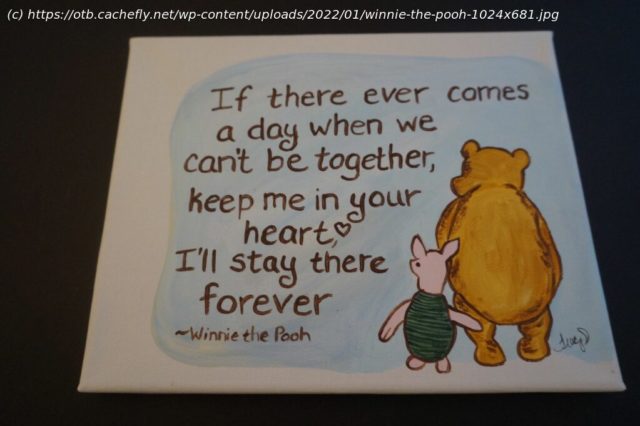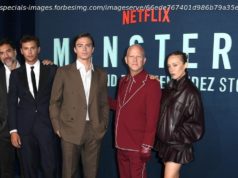But only the original books, not the Disney adaptations.
KSL (“ ‘Winnie The Pooh’ and more: 22 notable creative pieces head to public domain in 2022 “): Winnie and all his friends, from Tigger to Piglet, are moving to a new home. New Year’s Day marks the first day that thousands of classic pieces of art lose copyright or intellectual property rights as they enter a collective space known as the public domain. In the U.S., literature, music, movies and other creative pieces have 95 years before they end up in this collection of past art. The 2022 list is led by the A.A. Milne children’s classic “Winnie the Pooh” and Ernest Hemingway’s first novel, “The Sun Also Rises.” Hemingway’s first collection of short stories, “In Our Time,” entered the public domain last year. Another children’s classic character, Felix Salten’s “Bambi,” as well as works by Langston Hughes, Dorothy Parker and William Faulkner are also entering the public domain. But there are some film gems entering this year, including Buster Keaton’s “Battling Butler” and “The Son of the Sheik,” the final film of early film star Rudolph Valentino before his sudden death at the age of 31. All sound recordings published before 1923 are also heading to the public domain. That’s the result of interesting public domain rules, according to Jennifer Jenkins, the director of Duke University’s Center for the Study of the Public Domain. She notes that the country’s copyright law didn’t include sound recordings until 1972, meaning sound recordings could have been included in the 95-year window starting in 1972. But Congress, in 2018, passed the “Music Modernization Act” that shortened the window for pre-1972 recordings. It’s estimated that includes over 400,000 recordings entering the domain in 2022, according to the Association For Recorded Sound Collections. That includes renditions of the World War I anthem “Over There,” recorded in 1917 and 1918. Jenkins says there’s a good reason for the public domain. First, it allows community theaters and youth orchestras to learn from and present these pieces without dealing with costly licensing fees. Thousands of books can be made available through print or online, making them more accessible. “This helps enable access to cultural materials that might otherwise be lost to history.1926 was a long time ago. The vast majority of works from 1926 are out of circulation,” Jenkins wrote, in a public domain report. “When they enter the public domain in 2022, anyone can rescue them from obscurity and make them available, where we can all discover, enjoy and breathe new life into them.” This annual collection also fosters new art to emerge because current authors, musicians, playwrights, directors and artists can build off the work in the public domain. One of the most recent examples of this is the remake of “West Side Story,” which recently hit theatres. The 1950s musical was influenced by William Shakespeare’s “Romeo and Juliet.” “Who knows what the works entering the public domain in 2022 might inspire?” Jenkins adds. “As with Shakespeare, the ability to freely reimagine these works may spur a range of creativity, from the serious to the whimsical, and in doing so allow the original artists’ legacies to endure.” On her Duke Law page, Jenkins adds, The public domain is also a wellspring for creativity. The whole point of copyright is to promote creativity, and the public domain plays a central role in doing so. Copyright law gives authors important rights that encourage creativity and distribution—this is a very good thing. But it also ensures that those rights last for a “limited time,” so that when they expire, works go into the public domain, where future authors can legally build on the past—reimagining the books, making them into films, adapting the songs and movies. […] Just as Shakespeare’s works have given us everything from 10 Things I Hate About You and Kiss Me Kate (from The Taming of the Shrew) to West Side Story (from Romeo and Juliet), who knows what the works entering the public domain in 2022 might inspire? As with Shakespeare, the ability to freely reimagine these works may spur a range of creativity, from the serious to the whimsical, and in doing so allow the original artists’ legacies to endure. She also notes, as our late co-blogger Doug Mataconis repeatedly did, these works “were supposed to go into the public domain in 2002, after being copyrighted for 75 years. But before this could happen, Congress hit a 20-year pause button and extended their copyright term to 95 years. Now the wait is over.” Alas, she warns, Despite overwhelming evidence that term extension does more harm than good, countries are still extending their copyrights. The public domain remains under threat. This makes an understanding of its vital contributions—to creativity, access, education, history—all the more important. The verdict is in: adding an extra 20 years to the US copyright term was a “ big mistake .” This is not a quote from someone who is equivocal about copyright; it is a quote from the former head of our Copyright Office. Indeed, there is a consensus among policymakers, economists, and academics that lengthy copyright extensions impose costs that far outweigh their benefits. Why? The benefits are minuscule—economists (including five Nobel laureates) have shown that term extension does not spur additional creativity. At the same time, it causes enormous harm, locking away millions of older works that are no longer generating any revenue for the copyright holders. Films are literally disintegrating because preservationists can’t digitize them. The works of historians and journalists are incomplete. Artists find their cultural heritage off limits. (See studies like the Hargreaves Review commissioned by the UK government, empirical comparisons of the availability of copyrighted works and public domain works and economic studies of the effects of copyright (other articles are here and here).






